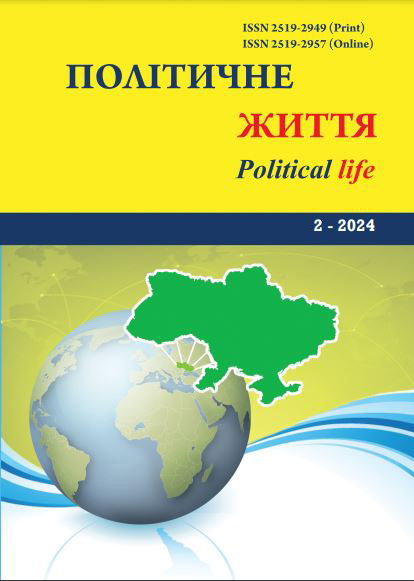Conceptualization of A. de Benoist’s political views as an ideologist of «new rights»
DOI:
https://doi.org/10.31558/2519-2949.2024.2.22Keywords:
Alain de Benoist, «new rights», ideology, postmodernism, anti-globalism, totalitarianismAbstract
The article analyzes the phenomenon of the European «new rights». The main stages of the development of the ideological beliefs of this political direction are highlighted: 1) 1958 – 1972. The stage of imitation of classic right-wing radical political views supported by pseudo-scientific biological theories; 2) 1972 – 1979. The stage of abstraction from biological determinism and shifting the research focus to the problem of egalitarianism generated by Judeo-Christianity; 3) 1979 – 1983. The stage of ideological adaptation, which emphasized the importance of ethnic pluralism and cultural diversity, as opposed to the «ethnocidal» influence of the USA; 4) 1984 – until today. A stage marked by the final choice in favor of the existing doctrine centered on a differentialist «pro-Third World» position, the postmodernism of «new rights» and the rediscovery of the «sacred» as the basis of a «deep-rooted» European identity. At this stage, it is indicated that overcoming the «totalitarian» influence of the USA is possible only through the political unification of Europe among itself and with the Third World.
Since totalitarianism from the point of view of the «new rights» is interpreted as any universal ideology, theory, concept, etc., communism is positioned by them as «the highest possible evil». Despite the fact that the egalitarian ideal of liberalism in theory is significantly different from the beliefs about the total equality of communism, however, it has the latter as its inevitable end. Thus, according to the «new rights», liberalism becomes a bridgehead for «democratic totalitarianism».
Since the main slogans of the «new rights» are «The right to be different» and «The end of all totalitarianisms», this movement tries to solve the problem of any expansion and gives every culture a sacred status. It is argued that the main enemy of the «new rights» is monotheism in any form, since this phenomenon is considered the main reason for the emergence of totalitarianism and ideological armed expansion.
Considering the fact that A. de Benoist is the main ideologist of the "new rights" in Europe, his political beliefs are revealed. In general, the ideas of the French philosopher can be summarized as follows: 1) atomization, affirmation, protection of heterogeneous cultures; 2) rejection of monotheism in favor of polytheism; 3) uniting Europe with the «Third World» for the sake of confronting the hegemony of the West and the East («Großraum»).
References
Taguieff P.-A. From Race to Culture: The New Right’s View of European Identity. Télos. 1993. No. 98-99. P. 99-125.
Benoist A. de Europe, Tiersmonde, mêmecombat. Paris: Éditions Robert Laffont, 1986. 253 p.
Benoist A. de L’ennemi principal URL: https://www.revue-elements.com/produit/mourir-pour-gdansk-version-pdf/ (date of access: 08.04.2024).
Walker M. Against all Totalitarianisms. The Scorpion. 1986. No. 10. P. 1-7.
Калюга І. Томіслав Суніч: Метафізика рівності // Український культурно-освітній проект «Пломінь». 2020. URL: https://plomin.club/tomislav-sunic-equality/ (дата звернення: 08.04.2024).
Калюга І. Томіслав Суніч: Тоталітаризм і егалітаризм. Український культурно-освітній проект «Пломінь». 2020. URL: https://plomin.club/totalitarianism-and-egalitarianism/ (дата звернення: 08.04.2024).
Versluis A. A Conversation with Alain de Benoist. Journal for the Study of Radicalism. 2014. Vol. 8, No. 2. P. 79-106.
Jefferson T. Patriotism and Merchants URL: https://cooperative-individualism.org/jefferson-thomas_ correspondence-patriotism-and-merchants-1814.htm (дата звернення: 08.04.2024).

